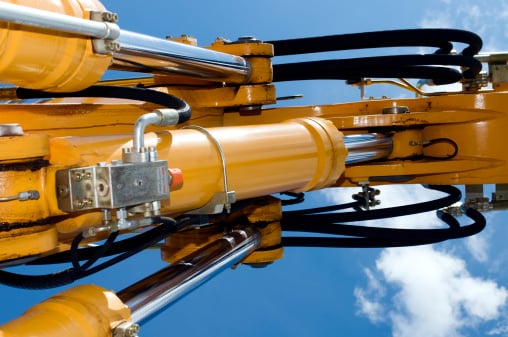Pneumatic and hydraulic cylinders have comparable uses, capabilities, and constructional elements in the agriculture sector, making it difficult to distinguish between the two. Both hydraulic and pneumatic cylinders apply force in order to produce the desired outcome, such as spinning, moving, pushing, or lifting. But despite producing results that are similar, the cylinders differ greatly from one another and are each best suited to particular pieces of machinery, uses, and systems.
Hydraulic versus pneumatic cylinders
The first step in differentiating the two systems and determining which is best to finish your agricultural project is to understand the benefits, drawbacks, and uses of pneumatic cylinders vs. hydraulic cylinders.
AUTHENTIC SYSTEMS
Pneumatic cylinders are a component of a system that operates at extreme pressure and uses compressed air to generate force. They are much more flexible than hydraulic cylinders, have a lower initial cost, and increase the whole system's safety. Due to the lower likelihood of stress damage to pneumatic equipment, they have extended operational lives and require less maintenance. Vacuum pumps, assembly lines, and other equipment are frequently run by pneumatic cylinders.
The nature of pneumatic systems makes it difficult for pneumatic cylinders to maintain constant velocity. They are less maneuverable than hydraulic cylinders, can only withstand 100 PSI of force, and cannot support loads when the machine is not in use.
AUTOMATIC SYSTEMS
Through pressurized fluids like oil, glycol, or other flame-resistant liquids, hydraulic cylinders provide force. The hydraulic system generates force in various locations as these fluids circulate to provide the required movement. In comparison to their pneumatic equivalents, hydraulic cylinders are stronger, allow for superior accuracy and control during operations, and have greater force capacities (1,500 to 10,000 PSI). A wide variety of equipment is powered by hydraulic cylinders, including:
1. escalators
2. Generators
3. Lifts on dump trucks
4. digging tools
5. Front loaders
6. Tractors
Hydraulic systems can be intricate and need routine maintenance to function properly. A poorly performed hydraulic cylinder inspection might result in system breakdowns and expensive downtime. Since hydraulic cylinders are made to withstand higher pressures, they also frequently weigh more and are larger than pneumatic cylinders.
Is Pneumatic or Hydraulic Equipment Better for Agriculture?
While pneumatic systems can offer upfront cost savings and safe operations, hydraulic systems are a preferable choice for the majority of agricultural applications due to their higher force capacities and enhanced precision. Bobcat or Kubota hydraulic systems, for example, are well suited for applications needing high PSI levels, heavy-duty capabilities, and durable equipment that can resist demanding conditions and frequent use. Although hydraulic systems need routine maintenance, the component parts are easily accessible and installable. Hydraulic agricultural equipment outperforms and outlasts the majority of pneumatic systems, from harvesters to crop sprayers and beyond.
HYDRAULIC CYLINDERS WILL PROVIDE EXCELLENT AGRICULTURAL PERFORMANCES.
You can get assistance from Hydraulics Cylinders, Inc. in locating the ideal aftermarket hydraulic cylinder for your equipment. We provide thorough how-to guides and expert advice on our blog in addition to our durable inventory to help you operate your hydraulic system.
Do you want to know more about how HCI can support your operations with its practical knowledge and high-quality goods? Call us right away. As soon as possible, a highly qualified expert will contact you to determine your best hydraulic option.
Contact us to learn more details on hydraulic cylinders.

